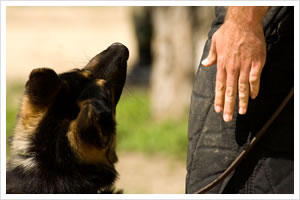Basic Commands In Dog Training
 There are of course many reasons for owners to want a calm, obedient and faithful dog. For one thing, obedient and trained dogs are happier dogs, less likely to get into tussles with people or with other dogs. Another reason is that many communities require that the dogs living in their neighborhoods be well trained. This is especially true for many breeds thought to have aggression and behavior problems – dog breeds like pit bulls and rottweilers for instance.
There are of course many reasons for owners to want a calm, obedient and faithful dog. For one thing, obedient and trained dogs are happier dogs, less likely to get into tussles with people or with other dogs. Another reason is that many communities require that the dogs living in their neighborhoods be well trained. This is especially true for many breeds thought to have aggression and behavior problems – dog breeds like pit bulls and rottweilers for instance.
And of course, training your dog well will also make he or she a much better family companion, especially in households where there are young children. Many studies have shown that proper dog training makes a big impact when it comes to cutting down the number of dog bits and other behavior problems encountered by dog owning households.
When considering training your own dog, or having someone else help you train it, there are certain basic commands that must be mastered in order for a dog to be considered truly trained. These basic commands include:
- Heel – it is important that any dog learn to walk beside its owner on a loose lead, neither pulling ahead nor lagging behind
- Respond to the word No – the word no is one word that all dogs must learn. Training your dog to respond to this important word can save you a ton of trouble.
- Sit – Training your dog to sit on command is a vital part of any dog training program.
- Stay – A well trained dog should remain where his or her owner commands, so stay is a very important command in dog training.
- Down – Lying down on command is more than just a cute trick; it is a key component of any successful dog training program.
Dog training does much more than just create an obedient, willing companion. Training your dog properly actually strengthens the bond that already exists between dog and handler. Dogs are pack animals, and they look to their pack leader to tell them what to do. The key to successful dog training is to set yourself up as that pack leader.
Establishing yourself as pack leader is a very important concept for any potential dog trainer to understand. There is only one leader in every pack of dogs, and the owner must establish him or herself as the dominant animal. Failure to do so leads to all manner of behavior problems.
A properly trained dog will respond properly to all the owner’s commands, and will not display anxiety, displeasure or confusion. A good dog training program will focus on allowing the dog to learn just what is expected of it, and will use positive reinforcement to reward desired behaviors.
In addition to making the dog a good member of the community, obedience training is a great way to fulfill some of the dog’s own needs, including the need for exercise, the security that comes with knowing what is expected of it, a feeling of accomplishment and a good working relationship with its handler. Dog training gives the dog an important job to do, and an important goal to reach.
Giving the dog a job is more important than you may think. Dogs were originally bred by humans to do important work, such as herding sheep, guarding property and protecting people. Many dogs today have no important job to do, and this can often lead to boredom and neurotic behavior.
Basic obedience training, and ongoing training sessions, provide the dog with an important job to do. This is especially important for high energy breeds like German shepherds and border collies. Training sessions are a great way for these high energy dogs to use up their extra energy and simply to enjoy themselves.
Incorporating playtime into your dog training sessions is a great way to prevent both yourself and your dog from becoming bored. Playing with your dog helps to strengthen the all important bond between you – the pack leader – and your dog.





